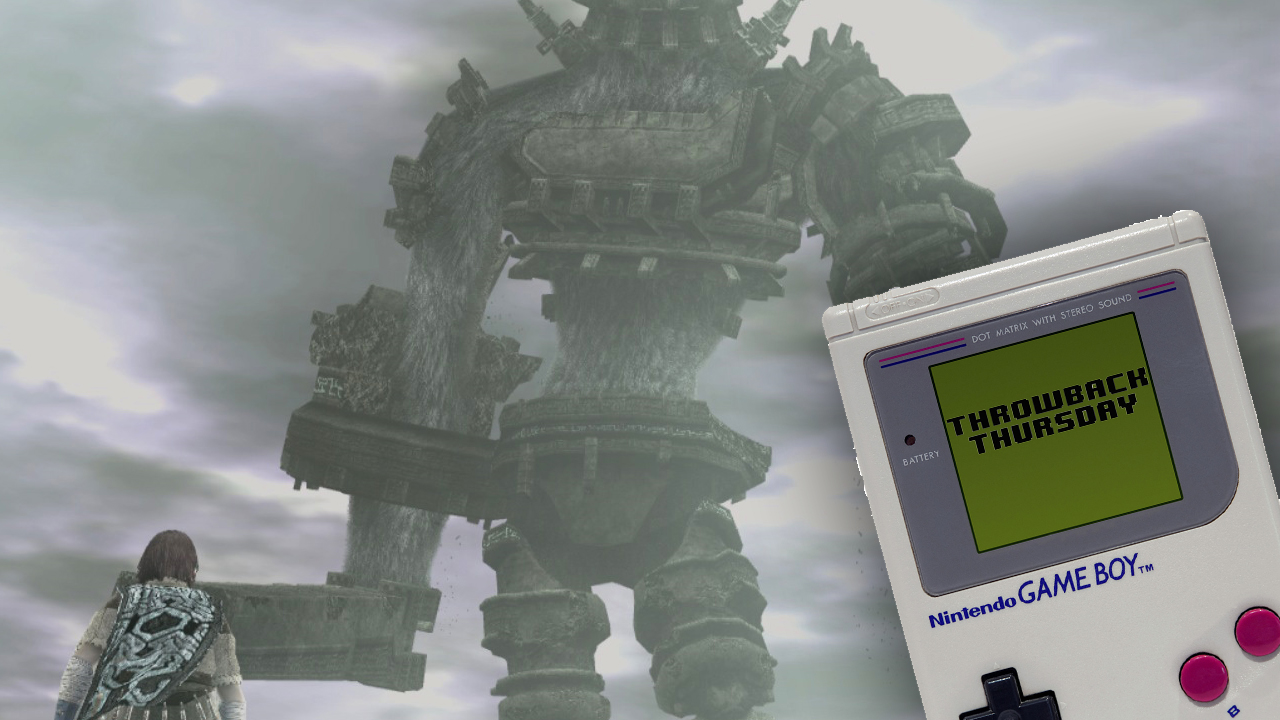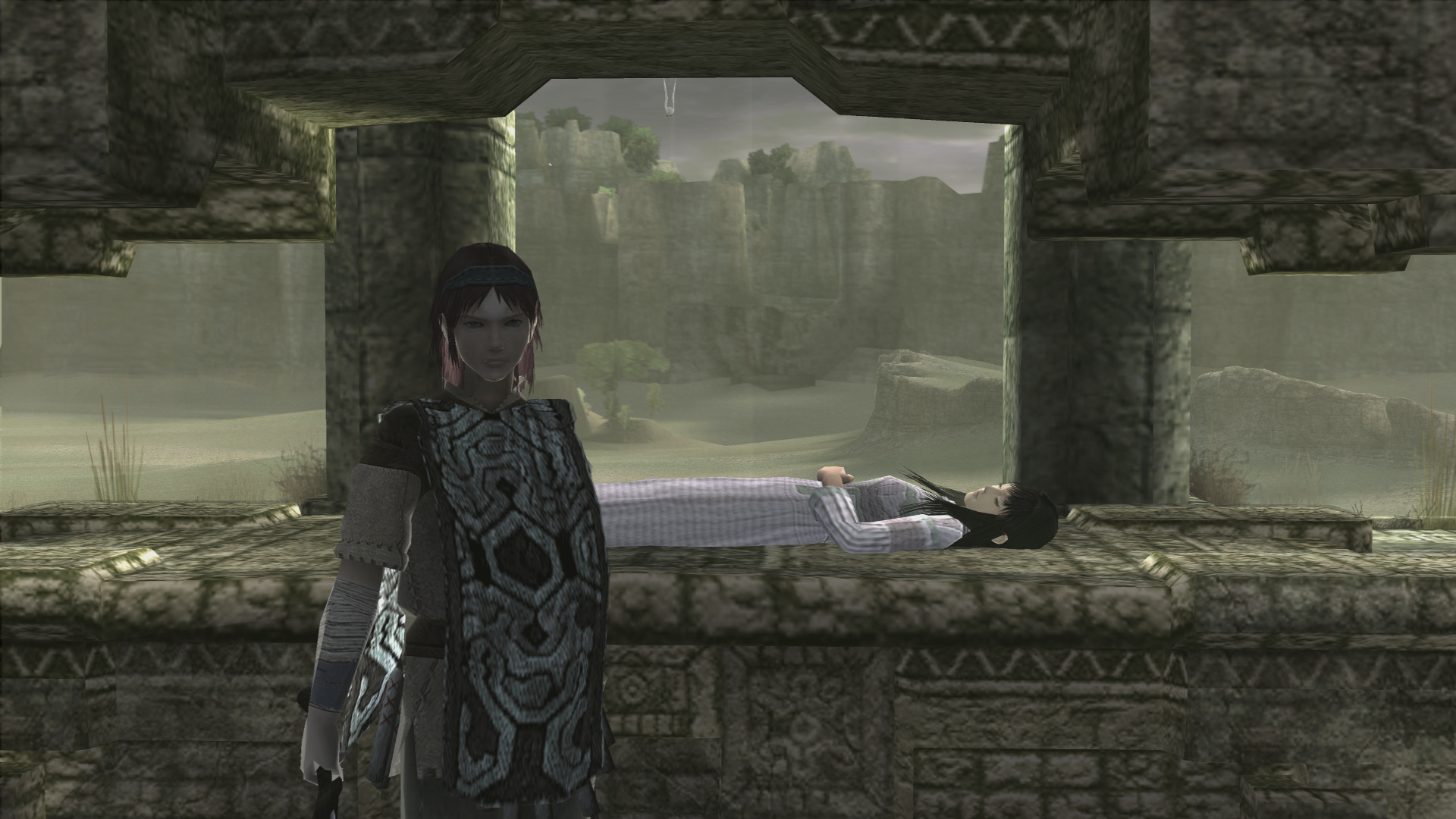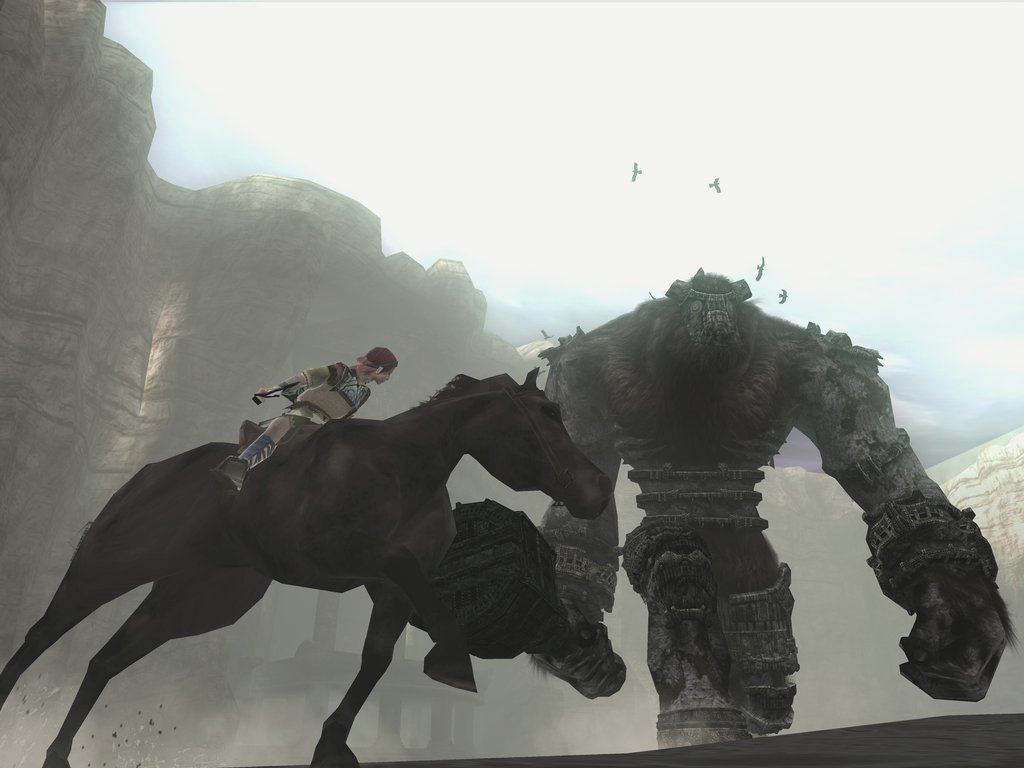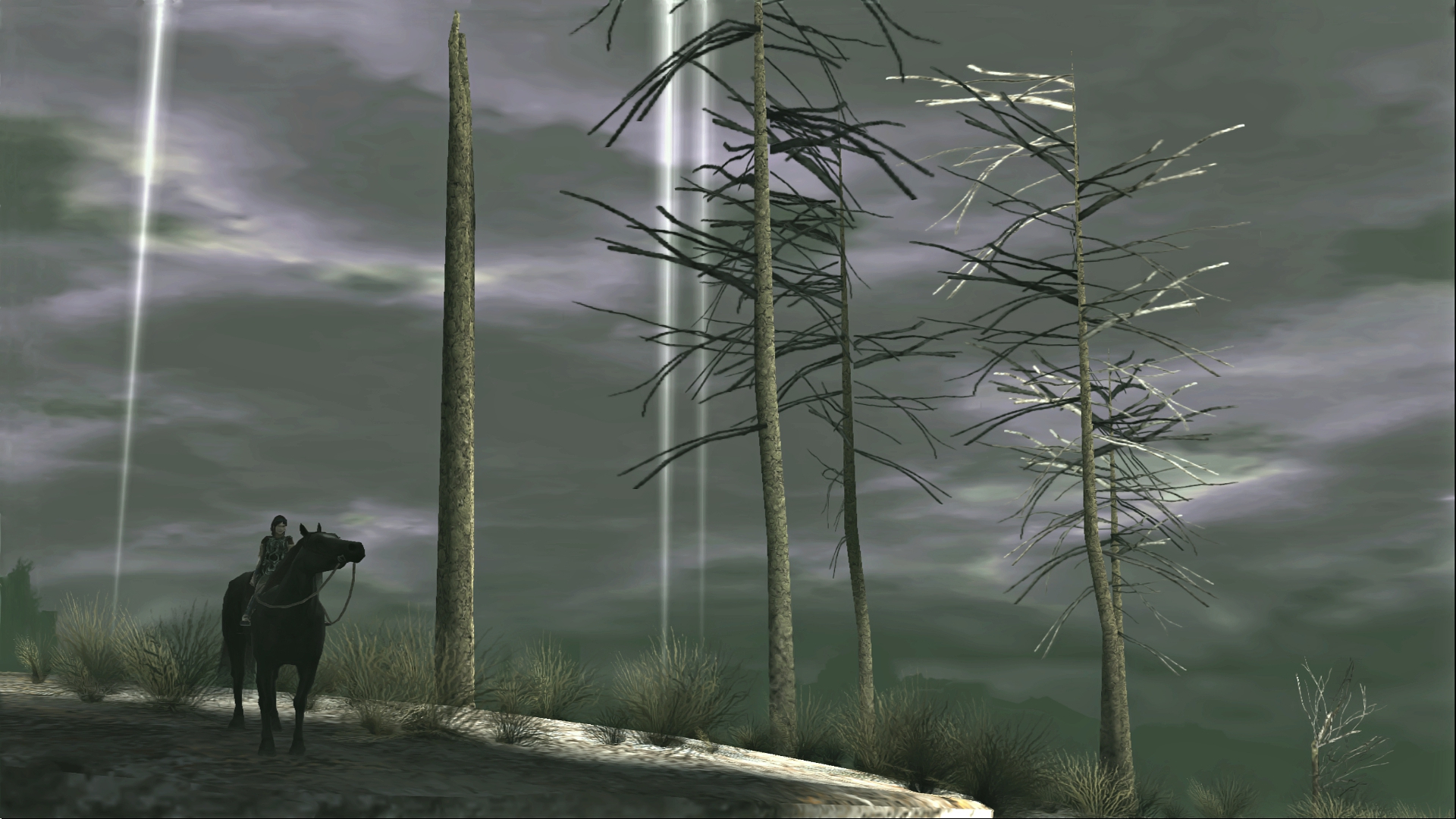Shadow of the Colossus and the danger of holding onto the past
Irony. Irony everywhere.

Before I grab you by the arm and drag you into my flux capacitor-equipped Mario Kart for this week’s Throwback Thursday column, I’d like to offer an apology for my absence last week. I do have a good excuse, though: I was attending E3 where I was focusing so much on the future of games I didn’t get a moment to go hands on with the past.
Lately, though, the future of games seems to involve a lot of nostalgic nods to days gone by.
This year Microsoft announced it was extending backwards compatibility to original Xbox titles, Nintendo revealed the classic Metroid series would be making its way to the Switch and Sony unveiled a trailer for a PlayStation 4 remake of Shadow of the Colossus.
That weird sound you heard during PlayStation’s E3 livestream? Yeah, it wasn’t a breeze – it was my sharp intake of breath. Colossus is my bae.
Return of the remake
I first played Shadow of the Colossus when it was released on PlayStation 2 2006, not long after I’d completed ICO which I’d unearthed in my local library’s rental section. Since its first release Shadow of the Colossus has been remastered for PlayStation 3 with improved HD resolution and some added PlayStation Network features.
The PlayStation 4 version promises to be a complete remake; though the game content will be the same it will apparently have entirely new assets and updated, modern controls.
Even though I knew I adored Shadow of the Colossus overall, my memories of the game’s specifics had become pretty vague. So on my return from E3 I decided to pull out my PS2 copy and see just how much a PS4 remake is needed.
Sign up for breaking news, reviews, opinion, top tech deals, and more.

First things first, if any game deserves an Ultra HD update it’s Shadow of the Colossus. To be honest, anything that comes from the minds of Team Ico should be in 4K but Shadow of the Colossus is especially deserving.
It may be minimalist but, boy, is it stunning and I really can’t wait to pore over every little detail in 4K. Plus, HDR support will be incredible in a game that makes such effective use of light and shadow.
Changing views
One of my favorite things about writing this column is that it gives me an excuse to jump back into games I haven’t played in years without feeling any guilt about my growing pile of unplayed brand new games (also known as my Smaug pile).
It’s amazing how much your view of a game can change purely because you yourself have changed and this was something that I found especially apparent when revisiting Shadow of the Colossus.
When I first played Shadow of the Colossus nearly a decade ago I very much took it at face value – its visual and narrative simplicity, to me, indicated that it was a simple but enjoyable game overall.
I was playing a hero, tasked with taking down evil giant monsters to rescue a beautiful princess. A classic tale, almost like an ancient myth. Of course, myths tend to be more than just stories.
Tale as old as time
This time my view was very different. This time it was apparent to me that Shadow of the Colossus isn’t a tale of heroism; it’s a tale of grief. More than that, it’s a tale of the inability to overcome grief and the dangers of that.
I still see Shadow of the Colossus as a beautiful puzzle not-quite platformer that stands apart from other games by virtue of its visuals and innovative gameplay and combat. However, I also now see it as a game that manages to intricately weave complex but universal human emotions into an epic, unearthly tale and somehow give me a greater understanding of them.
Basically, it got better, though there's a chance my mind has been ruined by an English degree that forced me to critically analyse things that potentially aren’t even there.

If you’re not familiar with it, the game follows a protagonist called Wander. Wander comes to the Forbidden Land on the back of his horse, Agro, with a sword in hand and the lifeless body of the beautiful Mono. He seeks out a powerful being who can return Mono’s soul to her body and bring her back to life.
The being, Dormin, tells Wander that first he must hunt down and defeat 16 Colossi across the land, but warns that Wander will have to pay a heavy price for what he wants.
“It doesn’t matter,” replies Wander.
This tells you everything you need to know. Wander is not driven by any kind of traditional heroism or self-interest, he just can’t let go of Mono and will do anything to see her returned to life.
The fact that after each Colossus defeat you’re returned to Mono’s side to see her lifeless body is good indication Dormin knows Wander’s inability to cope with loss is his manipulable weakness.
Not all those who wander are lost
Grief is an isolating, self-destructive and often desperate emotional state and all of this is reflected perfectly in Shadow of the Colossus’ world, character actions and the game controls themselves. We don't need any more words than "it doesn't matter."
Like Ico before it and The Last Guardian after it, Shadow of the Colossus doesn’t have much in the way of direct storytelling but it really doesn’t need it. Most of the story is told through action and environment which is as refreshing now as it was when the game was first released. It’s a lesson in ‘show don’t tell’.
Really, anything other than the game’s haunting, and far from overused, soundtrack would feel out of place in the world. Any excessive use of human voice, no matter how pleasant its tone, would ruin the innate melody of the game and ground it in a way that would undermine its sense of scale and universality.

The Forbidden Lands are huge, open and beautifully bare. You’re not going to encounter any NPCs here – it’s just you, your horse and your determination. The sense of loneliness this world manages to convey is sometimes overwhelming to the point that you’re thankful when the soundtrack begins to swell because it means you’re approaching something else even if it’s not someone else.
Though it’s often said you never forget the first time you see a Colossus in the game, I think the first time you bring one to the ground is more striking because it’s really not as satisfying as you expect it to be.
They’re some of the greatest boss battles in gaming because each encounter is unique and forces you to think, but across each fight there’s an underlying sense of scurrying desperation as you cling to these monsters and hope they don’t throw you off before you can locate their weak points.
The fact that some of them don’t even engage you in battle until you try to kill them really takes any sense of victory out of the defeat. In fact, as you move through each Colossus you only feel a growing sense of dread that you’re doing the wrong thing (because you totally are).

The game’s controls are often criticized for being clumsy and unintuitive and it’s said that they’ll be improved for the remake. Though they're sometimes problematic I hope they don't change too much because these controls also convey Wander’s grief and desperation in a way words couldn’t.
The fact that you have to hold down R1 to cling to a ledge rather than just tap it; the almost hesitant implications of having to press O twice to raise and swing your sword when fighting the Colossus; every action in Shadow of the Colossus feels very deliberate because of its controls, which only makes its ending more impactful and sad.
There’s even a scene towards the end of the game which gives you control of Wander seemingly only to make it clear how out of your control things have become.
Aggravating Agro
That said, I can’t really defend Agro’s AI and I can’t wait to see it improved. That horse is still as hopeless as I remembered and I can only assume Agro is short for aggravation because ugh. And although I appreciate the cinematic camera angles, they’re sometimes more of a hindrance than anything else.
Returning to Shadow of the Colossus has been a genuinely rewarding experience for me and although it’s possible that I’ve simply emotionally projected onto the game, the fact that I’ve been able to do so quite so easily speaks volumes for a game that barely speaks itself.
Now that E3 has physically drained me and Shadow of the Colossus has turned on the emotional tap I think it’s time to bring this column to a close before I slump over the keyboard.
The less we could all think about how the destructive nature of being unable to let go of the things we’ve lost plays into this column overall would be just great, thanks.
- Emma Boyle is taking a look back at games gone by (some of them older than she is.) Follow her time traveling adventures in her weekly Throwback Thursday column. Got any games you like to see her try? Let her know on Twitter @emmbo_

Emma Boyle is TechRadar’s ex-Gaming Editor, and is now a content developer and freelance journalist. She has written for magazines and websites including T3, Stuff and The Independent. Emma currently works as a Content Developer in Edinburgh.